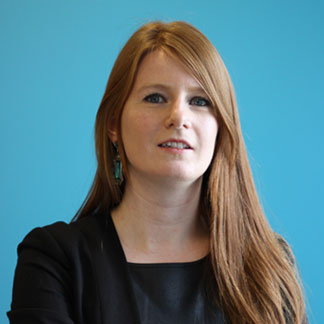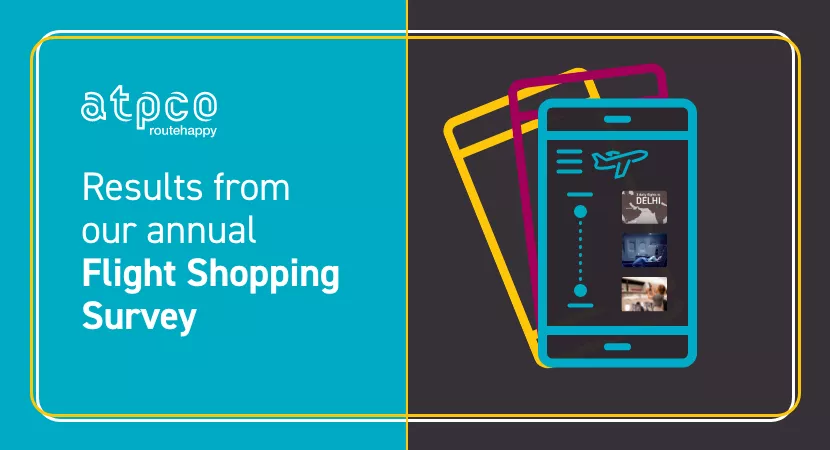On demand | Elevate 2022
Galvanizing green flight shopping, from standardizing datasets to communicating with customers
PANEL • THOUGHT LEADERSHIP
Sustainable aviation initiatives can’t work without transparency and industry standardization. To scale sustainable solutions as quickly and efficiently as possible, the industry must work together. For these initiatives to be successful, airlines have to use data to provide their customers with a complete picture of their commitment to reducing emissions, as well as harness data to change behavior and support ethical, responsible choices.
Join this urgent drive for a more sustainable world—this conversation is just the beginning of the game.
Sophie: Good morning, everything. This session is about how our industry can galvanize green flight shopping, and I’ll kick off with some good news. These are exciting times for aviation sustainability. The topic is no longer the elephant in the room, and many of us are thinking about it more and talking about it more, but not only that, real action is happening out in the world. There's real progress happening.
So, after airlines made their 2050 commitments with IATA last year, by June this year, around 30 major global carriers have set a Sustainable Aviation Fuel, or SAF, target. For many of them, for SAF to be 10% of their total fuel consumption by 2030. And SAF has been on the agenda for well over a decade. For some of these years, it's felt like there's not been much tangible progress.
However, the industry is increasingly seeing alternative fuels, including biofuels, as the way to ensure that as demand for travel increases, emissions don't increase in tandem. Because in fact, we need to substantially reduce emissions. Encouragingly, there's been an uptick in the number of airports that are giving carriers access to SAF.
So, at the beginning of this year there were 53, which is three times as many as in 2020. Before 2021 there were only two companies that were producing SAF at global scale, commercial scale. One here in the US and one in Finland. And now many more companies are getting into the business, especially in Europe.
And to complement this drive for SAF capacity, government support, for example the Inflation Reduction Act here in the US and the UK's Jet 0 initiative, are coming in to help increase the demand signal for SAF and to drive down costs because these are prerequisites to scaling this product. Just last week at the OK Assembly, states adopted a long-term aspirational goal, which should usher in even more supportive government policies.
Yet while there are plenty of reasons to be cheerful, let's remember why there's such a sense of urgency around this topic. Commercial aviation accounts for 2.5% of global greenhouse gas emissions at the moment. This could increase to 20% by 2050 without major intervention. The 2015 Paris Agreement, which was the starting gun for the green transition, said the upper limit of climate change increase to 1.5 degrees Celsius. And it looks like, from recent studies, we're going to hit that in 2034, which is sooner than they predicted in 2015.
And so, with the threats of climate change mounting, the travel industry has more challenges than we have solutions for. SAF is still a drop in the ocean—.01% of total jet fuel. Russia and China are not making as firm commitments as the rest of the world, and 80% of the world has never flown. So, if we're relying on people traveling less, that's not really going to cut it.
So, as a champion of consistent and accurate data, ATPCO is well-primed to facilitate this conversation around emissions and sustainable data in general. And I'm delighted to be accompanied by a panel of experts.
So please join me in welcoming Michael Vitalo, SAP Concur, Marion Chivot-Legris, Air France KLM, and Michael Schneider from IATA.
So, before we get into our discussion, do any of you know your estimated footprint for traveling to Elevate?
Marion: I calculated mine and my 90 kilo of CO2. I come from Montreal and it's always best to do a direct flight, and I had to do a connection on that one. So yeah, higher than expected.
Sophie: Michael, you had the longest trip, right?
Michael: I believe so yes, from Geneva. I came from Geneva. The footprint that I calculated was 2.7 tons, but I have to say, actually, I’m combining two trips in one. Flying to Montreal tomorrow. I have different meetings scheduled in Montreal and this was supposed to be two trips. So, I combined it into one trip, and we're offsetting our business travel usually.
Sophie: Michael?
Michael: I think I cheated. Mine was about 20 pounds. I live in Washington, DC, so a combination of ride share and metro.
Sophie: Thank you. Okay, so let's hear from you in the audience. I think this is the first Slido we've had today, but it’s super easy. So, you just need to scan the QR code or go to slido.com/ATPCO and the question is: Have CO2 emissions ever been a factor for you when comparing flight options? Yes, no, or no, but I will look at them moving forward.
So, I'll just give you a few seconds to figure that out and navigate to the site. Already people are doing it very rapidly. Just give you a few more seconds. So, it's looking like most people haven't factored in CO2 emissions, but this is why we're here. We're galvanizing. We’re galvanizing everyone. 31% will look at them moving forward, which is fantastic. And yes, 11% have factored in CO2 emissions when they've been comparing their flights.
Okay, so coming on to the next question. Oops, going back. So, it's safe to assume that most flying customers don't know much about SAF, which I was talking about in my introduction. So, backing up a bit, to what extent are flight shoppers currently engaging in sustainable flight shopping? Michael, kick us off.
Michael: We're seeing some encouraging data. We did a survey recently of just about 4,000 business travelers. 94% said they were keen to make more sustainable choices, be it combining two trips into one, taking rail instead of air (sorry airline friends) or taking mass transit instead of a taxi or something else. So, that is a pretty clear signal.
Additionally, we're seeing that 92% of those same respondents were saying they need to see the emission data in their corporate online booking tool and that's not just a glimmer, that's actual demand of engagement, and I think we need to leverage that.
Sophie: Yeah, Marion?
Marion: Well, I think it's true to say that the pandemic has put a big spotlight on our industry. We saw a lot of pressure coming from civil society when it comes to air travel. So, for sure, it was something to take in consideration. I think here in North America we have less alternative, I will say, for some routes, trains, et cetera. So, I think people are more willing to they ask questions. They’re a bit more curious about what are the solutions? What is the innovation for your sector?
So, I think we when we know and, it's true to say, that Europe is leading the topic when it comes to sustainable air travel. I think here in North America we have a true opportunity to set the standards for ourselves, to lead the pack, and to really kind of push and not wait for constraint… mandatory regulatory constraint. I think we have an opportunity to really set the standards.
Sophie: And, Michael?
Michael: Engaging is hugely important of course, but we have to also recognize the industry, and I'm representing here close to 300 airlines. We haven't been maybe entirely successful in communicating our challenges here and how we address the challenge. Basically, we have 21 gigatons of emissions in front of us until 2050. And how to address those?
We need to also recognize we have now 2 billion passengers—pre-covid 2 billion passengers. Our passenger numbers will increase to 10 billion passengers by 2050. So, we have to have some pretty good measures in place, and we need to communicate those measures very well.
SAF, of course, is an important part of this journey. To our account, 65% of the contribution in terms of the data harmonization efforts, technology plays a role. We have electric, hybrid, electric propulsion we have hydrogen powered aircraft, and we have offsets and air navigation system providers that help us, or we need to work with them together to make sure that we navigate airspace better.
But when it comes to passengers, then it's really CO2 transparency is where it starts, and here's really the problem, because if you, as a passenger, go to Google search or any other search engine and you look for your CO2 emissions and you will find maybe 10 different calculators and methodologies… you'll get 10 different results.
So, this leads to passenger confusion and distrust and actually it's pretty bad for the airlines because the airlines have made billion-dollar investments in latest aircraft model, each of them 15-20% more fuel efficient, and what they see is not reflected in that investment.
So, here we have a clear mandate actually. IATA received from our membership to develop a CO2 standard, a methodology basically, that allows to compare results and it's also taking into account some of the newer aspects, such as SAF or carbon offsets, that has to be part of the equation so we can calculate carbon intensity.
So, it's really what starts… looking at standardization of processes. Then, of course, we can also communicate the value of aviation. We bring it together, people, we connect people, it allows us to meet friends, families, but also, it's an economic engine, obviously. 100 million jobs are directly or indirectly connected to aviation. I think there's a story or a compelling story that we can tell.
Sophie: Thank you. So, Marion, you mentioned that our industry has the opportunity to lead and innovate sustainability for our customers. So what would you say are the drivers and the blockers to engaging more travel managers and flight shoppers?
Marion: Yeah, so, I can see three main drivers. I think the curiosity and the interest that for example B2C had given opportunity for us airlines to develop new products to develop solutions. So, for example, launching ancillaries that enable the customer to reduce their footprint. I think it's, it's an amazing driver to hear an interest from a B2C customer. I think it's similarly for corporate customers.
Corporate customers have more and more pressure to disclose their commitment towards climate change. So, they are looking for turnkey solutions, such as CO2 compensation program, or a sustainable aviation program, to really showcase their commitments. So, while they can, you know, continue doing business and flying, they're also at the same time take consideration of their footprint. The last driver is the regulatory landscape. I think it's fair to say that it helps shaping the transition.
If I take the example of Canada, the support that company received during the pandemic had some commitments toward climate change. So therefore, corporate accounts, they are looking for solution and when it comes to business travel, I think the landscape, the regulatory landscape, is a fabulous driver on that front.
In terms of blockers, I think we talk about lack of consistency and the fact that each airline may have their own calculator and I think it creates a blurry landscape for consumers. So, for me it's a major, major blocker.
I think there is also maybe the lack of investment. When it comes to sustainability, big data, it's a long-term investment. I think it should be part of the budget processes within an organization. It's a long-term investment. So, we have data, but how do we make sure it's consistent and visible?
And I will finish with the interest action gap. I don't know the exact term in English, but there is a McKinsey survey that just released recently that consumers are willing to pay up to $20 when it comes to reducing their footprint, but in reality the action is not there yet. So, it was very interesting to see the results because although people seem to be interested when it comes to actually paying for it, we're not there yet. So, I think this is also a blocker still to really kind of engage and making sure because there’s a reason why people are not yet paying for that footprint. Probably the amount.
Sophie: Michael?
Michael: Yeah, I can just echo what Marion just said, but I believe also that the travel managers, they actually in a quite difficult situation because most companies are corporates. They have set themselves very strict and stringent decarbonization goal. So, they are actually in the position or they are required to take decisions on behalf of the company and business travel represents usually the lion share of CO2 emissions. It's typically more than 90% you know when you compare to electricity, heating, and all the other things that scope three emissions that an organization has.
So here, I think it's for us, I mean from our point of view and representing industry, it's really about educating those travel managers, providing them with the guidance and tools and seamless solutions. And sometimes I have a feeling they're not always as seamless as they should be. So, there's a lot we can do and work together and I think there's quite some opportunities when it comes to the traveling public or the travel shoppers, it's maybe slightly different because here we have to maybe use a more simple approach using simple language, but still being transparent.
There's opportunities and if I, for example, use the example of compensation or carbon offsetting, there's a lot of skepticism whether those projects are being offered really meet environmental integrity criterias. Here we have an opportunity to really build a charismatic story to engage customers with those projects that are doing really a lot of good things, in addition to simply CO2 emission reductions, because often those projects are linked to socioeconomic core benefits.
It could be a cookstove project in Ghana, basically, that reduces your CO2 emissions, but those cook stoves, for example, are made by the local communities. It helps with gender equality. It creates jobs, it keeps people healthy and safe. So, there's a lot of those benefits that we can use and build a story that is compelling. So, I think that that's sort of maybe a suggestion here.
When it comes to the blockers, I think Marion mentioned many of them already, and maybe to add to them, it's really this is fragmentation that we see makes it very, very difficult. And I think there's, again, things that we could improve by standardization of processes here.
Sophie: And Michael?
Michael: I would add just a few things. For travel managers, I think the driver is their very senior leadership. We hear travel managers talk all the time about their travel programs and their expense programs being an extension of their corporate cultures and those larger corporate goals. And when those goals are set and the tone is set, travel managers who may be historically have been incentivized to look at preferred suppliers primarily through a cost lens are empowered and sort of even mandated to consider more options and weave that into their program. So, I do think there is a powerful sort of corporate culture play in the business travel program that we should be considering and talking about more.
In terms of travelers, business travelers, SAF… the knowledge gap is pretty big, right. So, the desire, the intent that I mentioned in that survey, I think we need to leverage that and take educational opportunities and teach people about some of these programs and initiatives that might not be super widespread yet, but people are asking, business travelers are asking, what they can do and reading them in on that story about those investments, about why a supplier is preferred. Most people interpret the preferred supplier is literally to save money. Yes, that's a big part of it, but a lot more goes into that. So, connecting those dots for business travelers would really help.
Sophie: That's a great point. I think when you say about corporate culture, it does start from the top basically. Okay, so this is probably more a question for Michael and Marion. Where do you see sustainability data working best in pricing and retailing? Like, is there such a thing as too much data? Is there anything going on with personalization?
Marion: Yeah, well, I think, again, I'm going to repeat myself, but I think clear data and consistency is the top number one priority, I think. We have so many different calculators between airlines, so it's difficult for consumer to compare. I don't think… I think personalized data is a good thing. There is always that big debate on loyalty programs, for example, when it comes to responsible or sustainable behavior as they align with responsible travel to encourage, responsible behavior. I mean it's not the debate today, but I think there is also that question.
And also another question I can ask is “what do we do with the existing data,” because there is already data and I think it's how we organize. So, I'm going to take an example that actually tied to ATPCO and the work that we do we do with you.
Within Air France KLM, we launched what we call a SAF search chase or sustainable aviation search chase for flight from France and from the Netherlands. It's tied to a mandate that we have since first of January 2022. In France, I think the Netherlands and KLM wanted to lead the pack as well on that front. So, we have a search chase and now, the question is, can we have a dedicated code, for example, to really report on that data? What do we do and track progress and also communicate and raise awareness?
I think you mentioned about the gap on education and explaining, and I think it's great to have something like search chase, but now we need to explain and we need to collect the data. So, I think, yeah maybe too much information, I think there is plenty of information up there, but what do we do with the existing one?
Sophie: Exactly. Putting it in the infrastructure. Okay, so again, drawing you in our audience. The next question is: Have you ever offset a flight? And so again, same thing. Scan the QR code and the choice is yes, no, or thought about it, but didn't. I hope I haven't messed this up because I actually did scroll to this before and there were some answers that came through. So yeah, we'll have to see whether this works.
Thank you if you did respond. I think it was predominantly no, which is kind of what we expect, especially given Marion’s comment about the intention or interest gap.
So, you may have all the best intentions in the world, but it's sometimes quite difficult to offset. You have to go to a different site, sometimes you have to input your flight details. It's not necessarily easy. And then also there's the issues around, who's getting the money for this and is the project worth the money? Is it really doing what it says it's doing?
So, thank you if you did participate and I'm sorry I missed that little bit up there. So, next question about data fragmentation. We've already talked about it a lot I think, but just to reiterate it because it is such a major issue. So, in what areas do you think sustainability data fragmentation is an issue for our industry? Michael, maybe you could take that one, Michael, sorry.
Michael: Now in my view, there are two key areas where there's data fragmentation and data is not really an issue, but problematic of course. It’s the whole transparency around CO2 data, which we already covered, and then it's about SAF, and it's really the objective of scaling up SAF, making SAF available. And right now, we saw I believe it was 53 airports, Sophie you mentioned, have SAF available. It's not a huge amount. I mean thousands, literally thousands, of airports here around the world and you want to make available SAF to everyone in the world, and not only to the few privileged airlines that have access maybe directly at the airport.
And here SAF book and claim is, of course, the approach that that should be taken and SAF book and claim, basically, this connects the physical use from the environmental attributes. So basically, the lifecycle emission reductions that you can achieve by use of SAF can be disconnected from the use. So, anyone investing in SAF should be able to make a claim without having to ship their fuel from North America to Africa, for example, to then generating additional emissions. So, book and claim is really essential here.
And what we see is there is a number of accounting methodologies and book and claim solutions that are being now developed, which is all great and we would like to see this type of development happen, but the problem is that, again, we are having a fragmentation here, we have different approaches. Maybe one approach is more geared towards corporates. Corporates basically can make an investment in SAF use and then claiming. Others are more geared towards maybe even airlines or few producers.
None of them are all-encompassing and that is really a tricky one. So, we need to really, and I guess IATA being asked to step up, and make sure that we end up with one global solution that is a fit for all, which is not easy because there's different interests here at play. But I think once we have achieved that we really have a backward basis for the scaling up and also of making the fuel available also that for price that makes economical sense. So that is really those two areas that I see critical.
Sophie: Great, and Michael?
Michael: I have a pretty different perspective on data fragmentation. Looking at large global travel and spend programs for corporates it is simultaneously local and global their programs, and most large enterprises use multiple GDS’s, multiple direct connect, the booking channels are immense, and then a fair number leak, right, and show up in expense as a request for reimbursement and we had no opportunity to influence the purchase. It just happened outside, right.
So, what we're really looking at is how do we get our clients hands around all of those carbon emissions, some of which they can influence by bookings happening in the booking tool, and then those they can't… that show up in expense. And then through all those booking channels, getting apples-to-apples comparison to actually then power a meaningful tally to then manage, make decisions about, and drive down.
So, the data fragmentation from a SAP Concur perspective is really about just the explosion of content into all different sources and the ability to honestly compare the different travel modes and help travel managers get to data that they can actually manage.
Marion: I think we don't have a lot of time left, but I think it's really well summarized by what the both Michaels just said. I think it's slow… the transition, the fragmentation, and I think in building trust for consumer or customer to make a choice, it doesn't help. So, I think once we have that, that will really help and accelerate the change that is needed for our industry.
Sophie: Great. So common themes from everyone, I mean, you all have a different perspective, but I think the takeaways are that there's obviously much more work needed on the aircraft side and on the alternative fuel side.
But one of the biggest challenges the industry is facing is around clear communication and transparency at critical points. So, thinking corporate procurement at the point of sale and also for ESD reporting.
So, it seems that if we can collaborate as an industry to reduce the data fragmentation that leads to competing datasets then we'll build consumer trust and better press and also help in building a more sustainable industry.
I want to ask everyone to continue to engage with ATPCO and others in the industry, really to increase and improve really the sustainability data and its distribution, because really it's up to us to galvanize green flight shopping by making green choices easy and convenient and their data transparent.
Thank you everyone for listening.
An event experience you can't miss
ATPCO's Elevate + ARC's TravelConnect
Speakers

Sophie Carkeek
Senior Strategist, ATPCO
Sophie evaluates what additional content ATPCO could and should be sourcing, ingesting, building, and distributing to bring value to the industry. She enjoys finding ways to simplify processes and improve industry standardization, and she is passionate about continually evolving content quality and reach. Sophie is currently working on Next Generation Storefront and is leading ATPCO’s work on sustainability.

Marion Chivot-Legris
Head of Sustainability, Air France‒KLM North America
Bringing with her over 12 years of experience in sustainability, Marion joined Air France‒KLM in April 2020. Based in Canada, she drives transformational change through advocacy, innovation, and partnerships on environmental initiatives and responsible solutions for customers, as well as diversity, equity, and inclusion. Previously, Marion served as Chief of Staff to the Global Head of Sustainability at Societe Generale, a global bank. Marion holds a master’s degree in strategic management and a MBA in Sustainability Strategy, both from La Rochelle Business School, France.

Michael Vitalo
Senior Director, Technical Product Management, Travel, SAP Concur
Michael leads a team of product managers who power the platform services behind Concur Travel & Concur TripLink. He also participates on a team of area product owners for Concur Travel where he helps ensure that product investments will scale to support evolutions in the broader corporate travel landscape.

Michael Schneider
Assistant Director, Environment & Sustainability, IATA
Michael is an aviation professional with 20+ years of experience in finance, environment, and sustainability. In 2012 he implemented IATA’s database to track the aviation sector’s fuel efficiency improvements and CO2 emissions reductions. He participated in ICAOs expert groups to help define the technical requirements for the first global and sectoral carbon offset and reduction scheme for international aviation (CORSIA). Since then, he has been driving several high-profile projects linked to the development of environmental reporting and compliance systems to assist airlines in meeting their mandatory or voluntary offset obligations, including FRED+ and ACE. Michael holds bachelor’s and master’s degrees in International Finance and Banking from the International University in Geneva and holds a diploma in International Business and Marketing from Michigan State University.
You might also like



